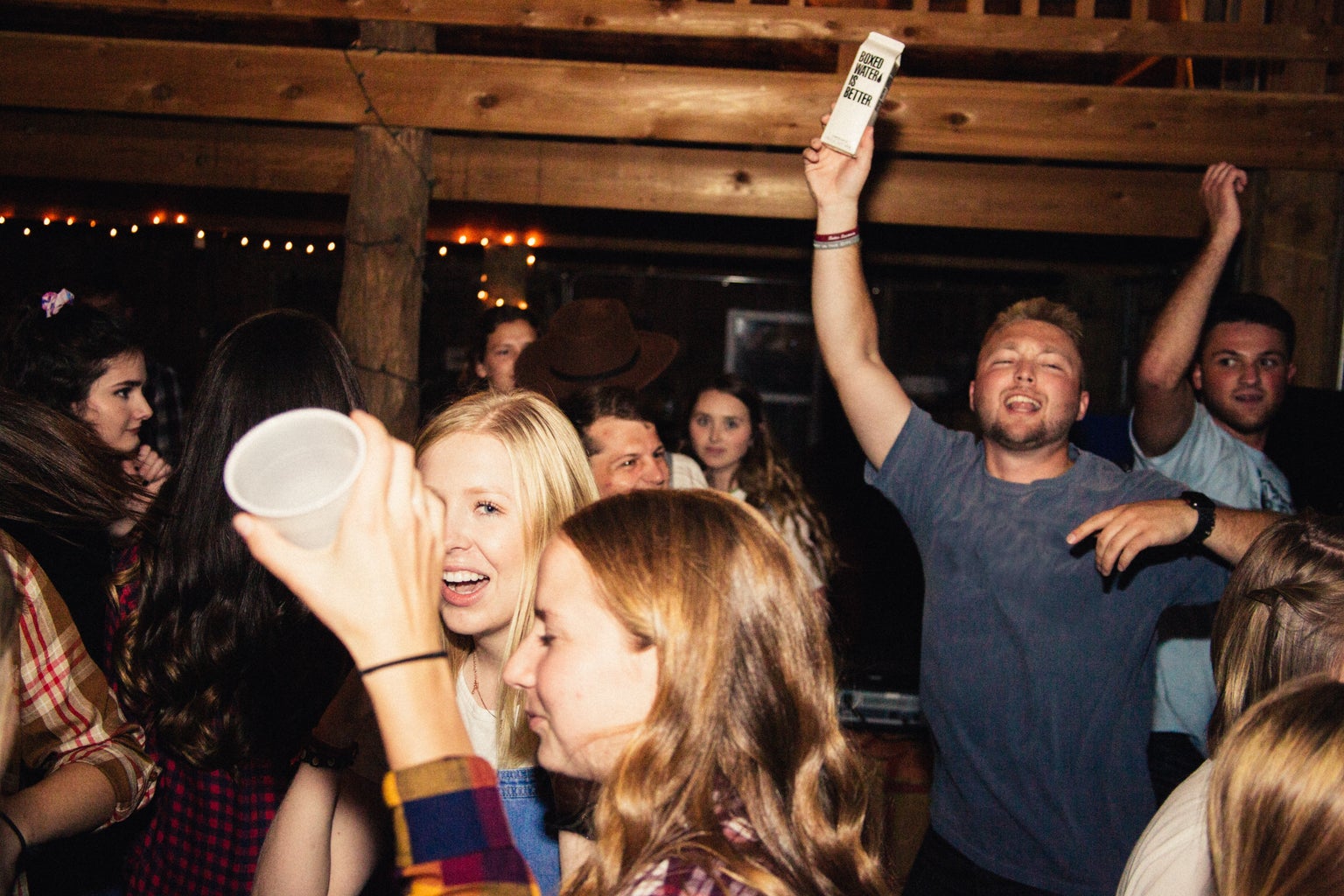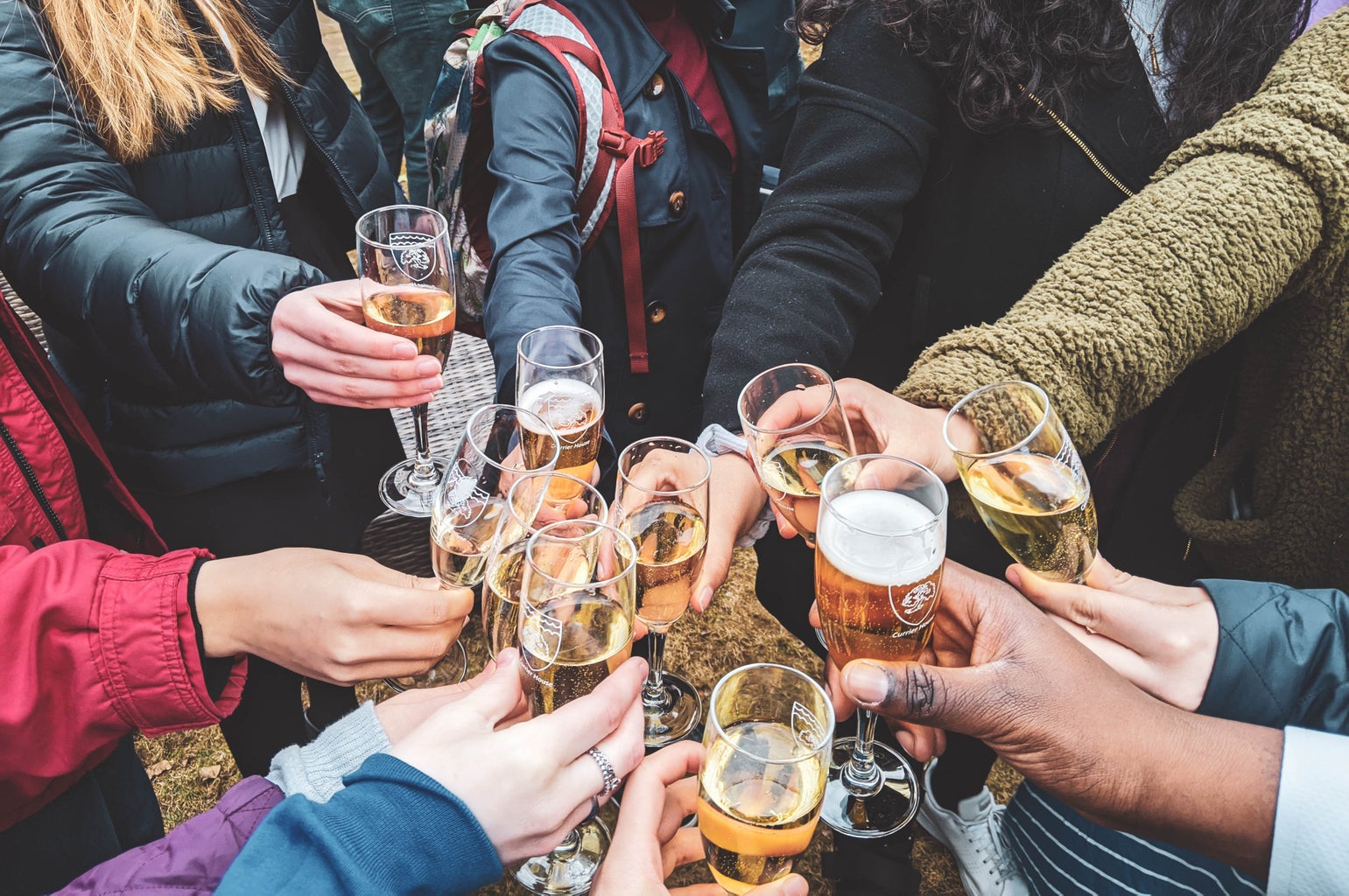At the ripe age of 21, my idea of a thrilling night includes watching reality TV in bed while adding a face mask to my already seven-step skincare routine. I used to think there was something wrong with me for relishing a night to myself. Turns out, drinking less alcohol, and having less sex, is more normal for Gen Z than you’d think.
After all, just like the rest of Gen Z, I’m in the “prime of my life” when I should be basking in my ability to miraculously fend off hangovers and engage in sexual escapades. But, Gen Zers like me are increasingly choosing mocktails and self-care days over tequila shots and one-night stands. In fact, the number of folks under the age of 35 who drink has dropped from 72% to 62% in the past two decades, according to a 2023 study by Gallup. And for sex? A 2021 study from The Youth Risk Behavior Surveillance System (YRBSS) showed that 30% of teens reported being sexually active as opposed to 50% in the previous generation. I can already hear Gen X screaming at us to get off our damn phones and just live our lives.
But, for Gen Z, decisions surrounding alcohol and sex carry not only empirical knowledge, but self-knowledge. In other words, with unparalleled access to health information, Gen Z feels empowered to choose what they want to do with their body. But, there is potential that this cautiousness is causing harm. I talked with sexologist Tara Jones, and addiction specialists Trent Carter and Benjamin Zelinski, to dissect what having less sex, and drinking less booze, says about Gen Z.
Mocktails are the new bevvy on the block.
It’s no secret that Gen Z is becoming more and more sober curious. And, for Gen Z, one of the largest appeals of sobriety is its benefits for mental health. “I’ve witnessed many patients expressing concerns about the impact of alcohol on their mental health,” Carter tells Her Campus. “This increased awareness has led to a decline in alcohol consumption and a rise in mindfulness practices.” The desperation for mental health care, alongside ease of access to information, has led Gen Z to deduce that hangxiety might just not be worth the buzz.
But, the concern doesn’t stop at mental wellness. In an increasingly health-conscious society, folks are abandoning drinking in pursuit of physical longevity. “Consuming less alcohol results in [health benefits] such as lower cholesterol, lower risk of heart disease, lower risk of liver disease, reduced blood pressure, and improved mental health,” says Zelinski. Oh, and I should probably mention, lower medical costs from the aforementioned ailments.
While mental and physical health are definitely a priority, Gen Zers may be interested in drinking less to excel in their personal and professional lives. “[Going sober] can help improve their academic and professional performance; with less drinking, a person can think more clearly and can be more productive,” Carter says. “And, lower alcohol consumption would result in a decrease in alcohol-related accidents and crimes.”
But there’s a catch when it comes to being sober in your 20s: your social life. While alcohol isn’t a prerequisite to friendship or having fun, in a society that’s centered around drinking, connecting with other folks may prove harder when you choose to abstain from alcohol. “Traditional social settings often involve alcohol, and a reduced emphasis on drinking may lead to Gen Z missing out on certain social experiences or feeling disconnected from their peers,” says Carter. “It’s crucial to ensure that individuals who choose to drink responsibly are not stigmatized.”
Overall, it appears that Gen Zers are making conscious, individual decisions surrounding alcohol consumption instead of mindlessly engaging in social norms. And in 2024, being confident in what you want, even if it’s drastically different from the norm, is kind of the coolest thing you can do.
Gen Z’s bed is for rotting, not sex.
Alcohol isn’t the only thing that Gen Z is having less of; they are also choosing to have less sex. Jones explains that a global pandemic, a difficult job market, and social media are all Gen Z-specific experiences that potentially affect aptitude for sex. However, the prevailing assumption as to why appears to be this generation’s emphasis on choice. “People might just exercise that newfound autonomy because they can,” Jones tells Her Campus. “Being able to make informed decisions around your sexuality also means there’s more room to experiment with what having different types of sex, having sex with different types of people, or even having no sex at all, can do for you.”
Deciding how you engage or don’t engage in sex is entirely individual, meaning that there is no overarching negative or positive to assign to the shift: Having sex can be just as empowering as not having sex! “[Gen Zers] might opt not to have sex out of health and safety reasons, as a response to sexual trauma, or because they have other things they want to prioritize at the moment, and each of those reasons could carry benefits,” says Jones.
However, this generational change may perpetuate the long-standing judgment that sex is shameful. “I do worry that in those cases, the decision not to have sex could further perpetuate a mindset that sex is immoral, or that non-men shouldn’t be having sex casually,” says Jones.
Social Media could be impacting Gen Z’s desire to drink up and hook up.
Gen Z’s changing outlook on sex and alcohol can potentially be linked to the unprecedented, rapid spread of information on social media. Whether through your childhood bestie sharing their sobriety journey, an Instagram graphic about consent, a chef posting mocktail recipes, or a doctor posting TikToks with medical advice, it is almost inevitable that you’ll begin to internalize these newfound cultural messages. “Social media has created a culture of constant visibility, and Gen Z being the biggest users of social media have become more mindful of their actions,” says Carter.
The only concern is making sure folks who choose to have sex and drink alcohol responsibly are not ostracized for exercising their autonomy. Social media can be a helpful tool for normalizing different alcohol and sex lifestyle choices, but it’s important to encourage individuals to listen to their voice, not trends.
Whether it’s booze or the bedroom, Gen Z is prioritizing choice.
Now, you might be thinking that you’re doomed to live a sexless life where you sit inside with a facemask on and lemon water in hand. Or, you’re thinking “Thank God, that’s exactly what I need.” But, that’s the beauty of Gen Z: You have the knowledge and power to choose the lifestyle you want. Gen Zers have access to information about physical and mental health that was previously reserved for medical professionals.
Additionally, through social media, Gen Z can explore perspectives and lifestyle choices that aren’t encouraged in their everyday lives. Gen Z is collectively empowering one another to choose a lifestyle that best suits their desires. So, personally, I don’t think it’s a good or bad thing that this generation is having less sex and drinking less alcohol: A society in which people are doing what’s best for themselves sounds like the healthiest kind of society. But who asked me, anyway?
As for the future, Jones says “The fun of it is that we have no idea how often future generations will have sex, since there will be additional factors that are impossible to predict.” And, as for the booze, Carter adds “The emphasis on holistic well-being, informed decision-making, and a balanced approach to life is going to shape a healthier and more conscious society.” I think it’s safe to say that Gen Zers will continue to exhibit their autonomy and find confidence in independent thinking.
Personally, I’ll just be sitting and watching it all go down with a mocktail (or mocktail with vodka) in hand. Cheers.






